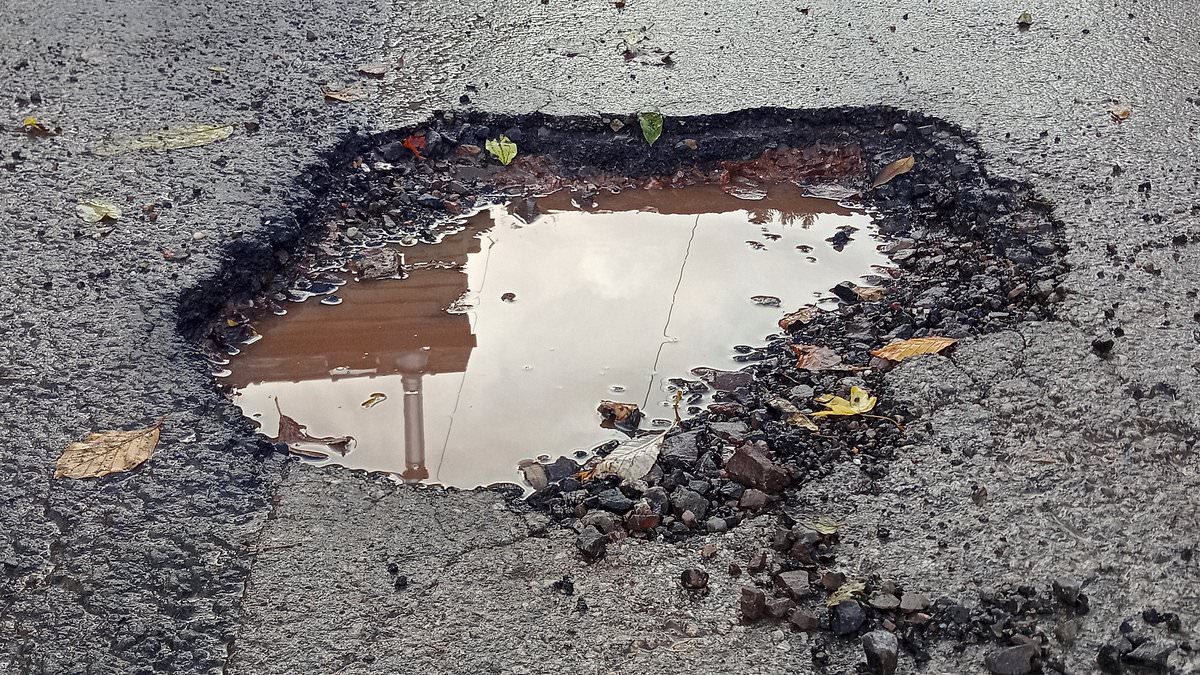Britain’s ‘pothole crisis’ has contributed to a seven-year high in the number of commuters killed or seriously harmed in accidents.
The dangerous holes can injure or even kill cyclists and motorists, and are popping up quicker than they can be filled.
On average, 15 people every month are killed or left with life-changing injuries in a crash started by the poor state of the roads, current figures show.
The figures, from the Department for Transport and reported first by The Telegraph, reveal that in the past seven years 61 people have lost their lives while a further 1,199 were seriously injured in crashes triggered by bad road surfaces.
The price of repairing vehicles damaged by potholes reached a record £579million last year, recent studies stated.
Those who use the roads who were most at risk during that period were cyclists, with 17 deaths, and motorcyclists, with 19 deaths.
The number of casualties has risen from the most recent stats in 2023, when the figures were at their highest since 2016.
A recent interactive graphic revealed the shocking extent of the problem – with some scientists believing that climate change is to blame.
This month, climate organisation Round our Way revealed 952,064 potholes were reported in Britain between January and November last year.
An interactive map revealed the local authorities with the most pothole reports during that period.
Edinburgh is the local authority with the most for the year (32 potholes per mile), followed by Kirklees in Yorkshire (26.1) and Newcastle upon Tyne (26).
Also in the top 10 is Hillingdon in London (24), Cheshire East (19.8), Darlington (16.9), Bolton (16) and South Gloucestershire (16).
When it comes to damaged vehicles, common problems caused by potholes include broken shock absorbers, faulty suspension springs and distorted wheels.
The AA said the total cost of fixing vehicles it attended in the UK which had broken down was the highest on record, and up from £474million in 2023.
Locals in a Welsh valley became so fed up of potholes in their area recently that they put up posters, banners and bunting welcoming drivers to ‘Pothole land’.
The campaigning residents of villages and hamlets in the Ceiriog Valley, near Wrexham, said some potholes on their streets are so large they have nicknamed them ‘elephant traps’ – and boasted they are among the ‘deepest, longest and widest in Wales’.
Drivers in the valley have also been left with huge repair bills and even 999 vehicles have been affected.
Wrexham councillor Trevor Bates, who drives a 4×4, said: ‘Two broken springs in a few months cost me £600. This is no joke.
‘Yet Wrexham Council has had to bow to the legal power of the off-road brigade and repair mountain tracks at a cost of thousands – and Welsh Government can find money for a new National Park.
‘With the dire shortage of funding for rural roads I don’t see how any significant improvement will happen in the near future.’
A Department for Transport spokesperson said: ‘For too long, this country has suffered from a pothole plague, which is why we’re investing a further £500 million next year, going beyond our original commitment to help fix up to a million more potholes annually.
‘We want to achieve this in the most cost-efficient way for the taxpayer by providing local authorities with multi-year funding settlements, enabling them to better maintain their road networks and avoid potholes being formed in the first place.’
Pothole numbers and severity are at crisis levels in the UK.
Over the last decade, more than 16.3 million potholes have been filled in England at a combined cost of £960 million.
Over 10 years between 2008 and 2018, 18 million potholes were filled, at a cost exceeding £1 billion.
The cost of repairing all of the UK damaged roads is even more staggering, estimated to exceed £10 billion and may take many decades to complete at the current rate.
The situation is expected to worsen with the rates of pothole occurrence increasing across the UK due to ageing roads, the increasing number of road users, and enhanced vulnerability under new extreme climate scenarios.
Conventional remediation methods are time-consuming, labour intensive and costly.
This is in part due to the outdated and localised repair methods, and poor on-site quality testing means that future repair of the same site is often required.
Robotiz3d says: ‘The posed solution to continually pump money into an increasingly out of control problem is unsustainable.’
In 2018, the number of potholes reported in Scotland was 16,645, in England 15,542 and Wales 3,729.
Source: Robotiz3d
